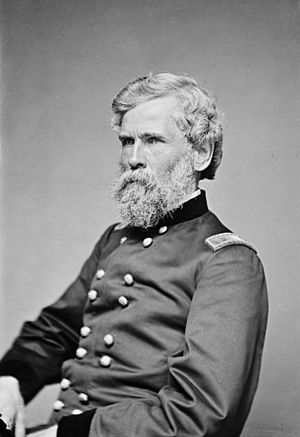Joseph Dana Webster facts for kids
Quick facts for kids
Joseph D. Webster
|
|
|---|---|

c. 1865
|
|
| Collector of Internal Revenue for the 1st District of Illinois | |
| In office 1875 - April 12, 1876 |
|
| Preceded by | Philip Wadsworth |
| Succeeded by | F.H. Battershall |
| Personal details | |
| Born | August 25, 1811 Hampton, New Hampshire, U.S. |
| Died | April 12, 1876 (aged 64) Chicago, Illinois, U.S. |
| Resting place | Rosehill Cemetery, Chicago, Illinois, U.S. |
| Military service | |
| Allegiance | United States of America Union |
| Branch/service | United States Army Union Army |
| Years of service | 1838-54, 1861-65 |
| Rank | |
| Battles/wars | Mexican War American Civil War |
Joseph Dana Webster was an important American civil engineer and soldier. He is best known for his work behind the scenes during the American Civil War. He was a top assistant, called a "chief of staff," for famous generals like Ulysses S. Grant and William T. Sherman.
Contents
Joseph D. Webster's Early Life and Career
Joseph D. Webster was born in New Hampshire in 1811. He went to Dartmouth College and finished his studies in 1832. After college, he worked as a civil engineer.
In 1838, Webster joined the U.S. Army. He became a second lieutenant in the U.S. Topographical Engineers. This group focused on mapping and surveying land. He fought in the Mexican–American War. By 1853, he was a captain in the U.S. Engineers. He left the Army in 1854.
Webster's Role in the Civil War
When the American Civil War began, Webster returned to the Army. On June 1, 1861, he was made a major in the U.S. Army Paymasters. These officers were in charge of paying soldiers.
Working with General Grant
In September 1861, Webster became the chief of staff for General Ulysses S. Grant. This meant he was Grant's main helper and organizer. Even though he was made a colonel of the 1st Illinois Light Artillery Regiment in February 1862, he stayed by Grant's side. He helped Grant during important battles like Belmont, Fort Henry, Fort Donelson, and Shiloh.
At the Battle of Shiloh, Webster played a key role. He helped gather many cannons to support Grant's last line of defense. This happened near Pittsburg Landing.
Promotions and New Duties
On April 4, 1863, President Abraham Lincoln promoted Webster. He became a brigadier general of U.S. volunteers. This rank was effective from November 29, 1862.
In late 1862, Webster was put in charge of railroads in the Department of the Tennessee. He later became the Chief of Transportation for the Army of the Tennessee. This was very important during the Siege of Vicksburg. He then took on this role for the entire Military Division of Mississippi.
Working with General Sherman
When William T. Sherman became the commander of the Military Division of Mississippi, he chose General Webster as his chief of staff. Webster worked with Sherman through several major campaigns. These included the Atlanta Campaign, March to the Sea, and the Carolinas Campaign.
On March 13, 1865, Webster was given the honorary rank of major general of U.S. volunteers. He officially left the volunteer service on November 6, 1865. On January 13, 1866, President Andrew Johnson confirmed his honorary major general rank.
After the War
After the Civil War, Joseph Webster worked as a collector for the Bureau of Internal Revenue. This government agency collects taxes.
Joseph Webster passed away in Chicago, Illinois, on March 12, 1876. He was buried at Rosehill Cemetery.
 | Percy Lavon Julian |
 | Katherine Johnson |
 | George Washington Carver |
 | Annie Easley |

